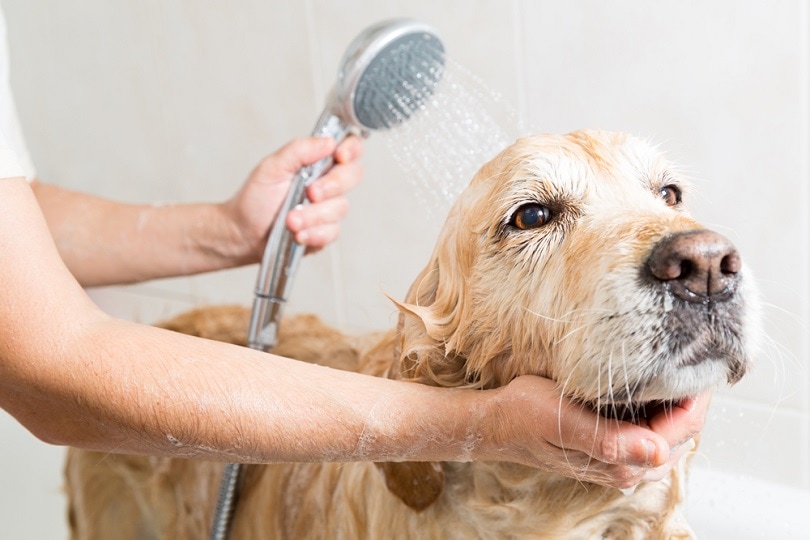
Click Below to Skip Ahead
Golden Retrievers are one of the most popular dog breeds globally due to their incredible personalities and gentle nature. Since their humble beginning as hunting dogs, they have graduated from this role and landed themselves in homes all over as the ultimate companion animal—and for good reasons.
Breed Overview
Height:
21–22 inches
Weight:
55–75 pounds
Lifespan:
10–12 years
Colors:
Cream, yellow, golden, red
Suitable for:
Active families, service roles, therapy, hunting, companionship
Temperament:
Loyal, attentive, affectionate, active
Golden Retrievers are gorgeous specimens with outstanding character, so it is no wonder that they are frequently used to make new hybrid dog breeds as well as being trained as service dogs and therapy animals. They have a special place in the hearts of many, and they might just be the perfect fit for you and your family.
Golden Retriever Characteristics
Golden Retriever Puppies

Golden Retriever puppies are incredibly common and are purebred dogs. Therefore, the cost of a Golden Retriever dog depends significantly on its lineage, the area you live in, and any previous training. We want to specify this because Golden Retrievers can go through some pretty intensive learning to fulfill specific roles for their humans.
Also, many Golden Retrievers are show quality, but you can buy pet-quality Goldens as well. Because of the popularity of Golden Retrievers, backyard breeding practices are, unfortunately, a commonplace occurrence, so it is incredibly important that you take all precautions to avoid supporting unsafe or unethical breeding practices.
These dogs can be the product of puppy mills and poor breeding practices that lead to a quick decline in health, behavioral concerns, and overall poor quality. When you welcome a Golden Retriever into your family, it should always be from a reputable rescue agency or a breeder with a long history of producing healthy litters.
Temperament & Intelligence of the Golden Retriever
Golden Retrievers are incredibly brilliant dogs that have very high learning potential. Since these dogs are so eager to please and extremely loyal, you shouldn’t have much of a problem with training. Of course, some can be more stubborn than others, so keep that in mind.
They can be slightly challenging as puppies, since some can be quite hyper and take a bit of time to mature. But don’t let their puppy stage fool you—these dogs are much more intelligent than what you might initially give them credit for.
Golden Retrievers tick pretty much every box there is when it comes to canine comradery. They are excellent for companionship, hunting, service, therapy, and show. Because of these intensive tasks, these dogs need to have supreme learning capabilities.
These dogs tend to be very emotionally intuitive, picking up on their human companions’ emotions and body language. For this reason, they make excellent therapy dogs for adults or children with disabilities or anxiety disorders.
Even though it isn’t as common to see a Golden Retriever in a hunting role nowadays, they are still just as equipped as ever. They have incredibly excellent skills with retrieving, able to withstand the elements in both water and land settings.
They do very well with commands and listen intently to owners. Because they have such strong connections to humans, they do best with positive reinforcement training. Harsh punishments or negative feedback is unnecessary and can damage their spirit, so be gentle and reassuring but firm.
Are These Dogs Good for Families? 👪
Golden Retrievers are one of the most highly recommended dogs for growing families. These dogs are incredibly kid-friendly, looking after little ones and even protecting them if it came down to it.
These dogs are also usually mild enough for older adults. However, if you are an older adult who would love to have a Golden Retriever it might be in your best interest to get one with previous training or a slightly older dog that has surpassed the puppy stage.
These dogs would absolutely adore going on any family adventure with you. Because of their friendliness and willingness to interact with strangers, Goldens are great for company barbeques, festivals, hiking, and all other activities.

Does This Breed Get Along With Other Pets?
Golden Retrievers make excellent companion animals for other canines and cats. These dogs might have a bit of a prey drive, but their docile nature typically takes over, making them compatible with smaller pets.
Goldens are very good-natured dogs, even if they are a bit hyper when they’re young. They make terrific companion animals for other pets—both new and existing. They tend to acclimate well to new situations and make excellent candidates for dog park trips.
However, cage animals should always be closely monitored, if not completely separated, from these animals. Accidents do happen. If your dog instinctually bites or even just plays too rough, a smaller animal could face unfortunate consequences.
Things to Know When Owning a Golden Retriever
Food & Diet Requirements 🦴
Your Golden Retriever will need a diet of high-quality dry dog food every day. Golden Retrievers are very prone to obesity, and other dietary problems, so proper rations and clean diets are essential for this breed.
Several dog owners are super supportive of the idea of raw food and homemade diets. The best idea is to get a vet’s approval before doling out a homemade recipe to your pooch. You will want to make sure that you’re following all of the necessary nutritional profiles.

Exercise 🐕
Exercise is an essential part of your Golden Retriever’s life. They need plenty of physical activity to cater to their muscles and minds. These dogs will absolutely go nuts over a game of fetch or other yard activities. They also love walks to explore the neighborhood and all of the new sights and smells.
On average, your Golden Retriever should have at least 45 to 60 minutes of exercise per day. You can break this up into two walks—one in the morning and one in the evening. Or you can play their favorite games with them to stimulate them appropriately.
These dogs also can make superb jogging companions.
Training 🎾
Golden Retrievers are pros when it comes to training. These dogs take on a wide variety of tasks and can accelerate and adapt tremendously fast. When it comes to basic commands, these dogs will get the concepts down in no time.
These dogs have served hunters since the dawn of the breed. They are brilliant and care very much about what their owners think. This combination makes for a highly trainable dog that does excellent with positive reinforcement training.
Golden Retrievers are incredibly well-versed in terms of service and therapy. Often, trainers will take Golden Retrievers to train them for intensive tasks such as diabetes maintenance, leading the blind, and serving as a support animal for autistic children.
These dogs are incredible for just about any type of task that involves helping humanity.
Grooming ✂️
Even though Golden Retrievers have long hair, they are not extremely difficult to maintain. You can gently brush them once a day for optimal results. These dogs benefit from multiple types of brushes, however.
You can buy a slicker brush for everyday brushing, but it would be a nice idea to use a de-shedding tool every few weeks. These tools get the tough undercoat and the debris that is beneath the top layer of fur.
It’s best to give your Goldie a good scrub down once every 4–6 weeks in the tub. Afterward, make sure that you clean their ears to prevent infection and give their nails a good trim.
We recommend you brush their teeth daily to prevent future periodontal disease. If you notice excessive drooling, talk to your vet.

Health and Conditions 🏥
Golden Retrievers have a few health concerns worth mentioning. These dogs are incredibly prone to cancer, which is the number one leading cause of death in the breed. However, these dogs can live long, happy lives with no or few complications with proper diet and exercise.
That being said, it’s best to be aware of the challenges that might come with owning one of these extraordinary dogs. During your puppy’s first year of life, they need lots of health checks to ensure their growth is on par and they have all of their necessary vaccines.
Afterward, it would be best if you took your dog in for an annual check-up every year to keep up on developing issues and maintain overall health.
Male vs Female
Male Golden Retrievers are larger than females, weighing between 65 and 75 pounds. Females, on the other hand, weigh approximately 55 pounds.
Male retrievers have thicker bodies, stout and sturdy, with blocky heads and broad muzzles. Females tend to be a bit sleeker with narrower faces.
As far as personality is concerned, each dog will have their own special character. But males tend to mature a bit slower than females, making them more challenging to train, at least initially.
Females tend to be motherly creatures who parent human children out of instinct. Males tend to be better playmates, ready to romp around in the backyard or play a good game of tug of war.
3 Little-Known Facts About the Golden Retriever
1. Golden Retrievers have webbed feet, making them optimal swimmers
If you take a look at your Golden’s paws, they have the most adorable webbed feet. This genetic trait is used to help them swim through marshes, creeks, and rivers to retrieve prey for hunters. Now, it just makes them really terrific swimmers.
2. Golden Retrievers are consistently among the top 3 favorite breeds
Goldens have consistently maintained their slot in the top three favorite breeds on the AKC popularity list across the US. Many families welcome this breed to their homes because of its admirable personality and charm.
3. Golden Retrievers have a variety of coat shades
Even though they are called ‘golden’, they vary in shades from light cream to mahogany. There’s even a Red Golden Retriever! However, all are considered the same breed.

Final Thoughts
So, now that you know all the ins and outs of the Golden Retriever breed, do they sound like a good pick for you? If so, remember to adopt responsibly from reputable breeders to ensure puppy quality and healthfulness.
Since this is such a popular breed, you can surely find one at a local shelter or breed-specific rescue. If you are willing to give a Golden a second chance at a better life, they surely won’t disappoint. Or you can check out this list of dog breeds that look like Golden Retrievers!
Featured Image Credit: Olena Brodetska, Shutterstock








